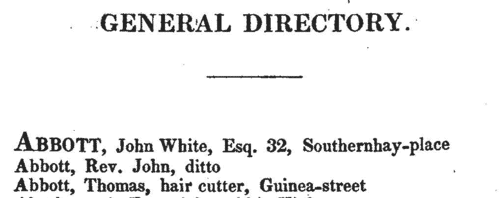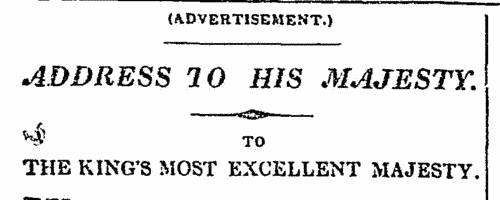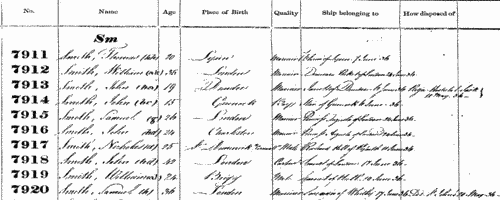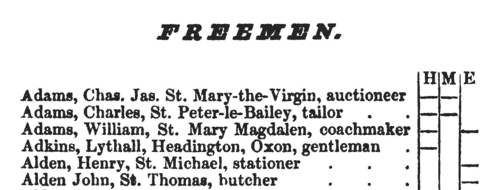Add this eBook to your basket to receive access to all 462 records. Our indexes include entries for the spelling underhill. In the period you have requested, we have the following 462 records (displaying 181 to 190): These sample scans are from the original record. You will get scans of the full pages or articles where the surname you searched for has been found. Your web browser may prevent the sample windows from opening; in this case please change your browser settings to allow pop-up windows from this site. Residents of Exeter
(1828)
The 'Exeter Itinerary and General Directory, ... A Walk through the City and Suburbs, with an Account of the Public Buildings, and Institutions; an Abridged History of the Cathedral; A List of the Body Corporate, Public Offices, Companies, &c. &c. Embellished with a neat Map of the City', published in June 1828, includes this 'List of the Nobility, Gentry, Merchants, and Traders Of Exeter, Heavitree, St. Thomas, Alphington and Ide'. | Sample scan, click to enlarge

| Inhabitants of Devon
(1830)
Pigot & Co.'s National Commercial Directory lists traders, farmers and private residents in the county. | Sample scan, click to enlarge

| Inhabitants of Dorset
(1830)
Pigot & Co.'s National Commercial Directory lists traders, farmers and private residents in the county. | Sample scan, click to enlarge

| Freemen of the City of Oxford
(1834)
A List of the Freemen and Householders of the City of Oxford, Registered July 31st, 1834, as Entitled to Vote in the Election of Members for the said City. This starts with an alphabetical list of the freemen of the city, which gives (as in the sample scan) full name, address and occupation. Then follow lists of householders, by parish or ward, but without giving occupations. | Sample scan, click to enlarge

| Merchants, Bankers, Shipowners and Traders of London
(1834)
The public prints of December 1834 carried this loyal address to king William IV of merchants, bankers, shipowners, traders and others connected with the city of London, requesting 'permission at the present juncture to address your Majesty for the purpose of renewing the expression of our dutiful and loyal attachment to your Majesty’s person and crown. Deeply sensible of the practical blessings we have hitherto enjoyed under our wisely mixed constitution of King, Lords, and Commons, and feeling that the free and legitimate exercise of the Royal prerogative forms an integral part of that constitution (as essential to the maintenance of our own liberties as to the power and dignity of the Throne), we beg humbly to assure your Majesty of our determination steadfastly to uphold the same by every means in our power.
'Feeling, in common with all classes of your Majesty’s subjects, the deep importance of applying to all real abuses, wherever they may be found, a wholesome and timely correction, and of effecting in our excellent institutions every improvement of which careful examination and experience may prove them to be susceptible, we desire further dutifully to express our entire confidence that these useful purposes will ever occupy your Majesty’s paternal care. Nor can we permit ourselves to believe that the importance of these objects will be less apparent to those to whom the powers of government have been recently intrusted.'
Full names are given (or surname with initials), and address. Over 5000 subscribed.
| Sample scan, click to enlarge

| Dissolutions of Partnerships
(1835)
Trade partnerships dissolved, or the removal of one partner from a partnership of several traders
| Sample scan, click to enlarge

|  British merchant seamen
(1835-1836) British merchant seamen
(1835-1836)
At this period, the foreign trade of ships plying to and from the British isles involved about 150,000 men on 15,000 ships; and the coasting trade about a quarter as many more. A large proportion of the seamen on these ships were British subjects, and so liable to be pressed for service in the Royal Navy; but there was no general register by which to identify them, so in 1835 parliament passed a Merchant Seamen's Registration Bill. Under this act this large register of British seamen was compiled, based on ships' crew lists gathered in British and Irish ports, and passed up to the registry in London. Each seaman was assigned a number, and the names were arranged in the register by first two letters of the surname (our sample scan shows one of the pages for 'Sm'); in addition, an attempt was made to separate out namesakes by giving the first instance of a name (a), the second (b), and so on. But no effective method was devised to prevent the same man being registered twice as he appeared in a second crew list; moreover, the original crew lists were clearly difficult for the registry clerks to copy, and some of the surname spellings appear to be corrupted. A parliamentary committee decided that the system devised did not answer the original problem, and this register was abandoned after less than two years: but it is an apparently comprehensive source for British merchant seamen in 1835 to 1836. The register records the number assigned to each man; his name; age; birthplace; quality (master, captain, mate, 2nd mate, mariner, seaman, fisherman, cook, carpenter, boy &c.); and the name and home port of his ship, with the date of the crew list (usually at the end of a voyage). Most of the men recorded were born in the British Isles, but not all (for instance, Charleston and Stockholm appear in the sample scan). The final column 'How disposed of' is rarely used, and indicates those instances where a man died, was discharged, or deserted his ship during the voyage. | Sample scan, click to enlarge

| Staffordshire Inquests
(1836)
The accounts of expenses incurred by Henry Smith of Wolverhampton, Staffordshire coroner, list the full names of the deceased, the date and place of each inquest. January to December 1836 | Sample scan, click to enlarge

| Dissolutions of Partnerships
(1837)
Trade partnerships dissolved, or the removal of one partner from a partnership of several traders: in England and Wales
| Sample scan, click to enlarge

| Freemen Voters in Oxford
(1837)
A poll of the freemen and non-freemen electors of the City of Oxford took place on 25 July 1837, the candidates being William Hughes Hughes (H), Donald Maclean (M) and William Erle (E). This poll book lists all 2145 voters, as well as those electors who did not vote. In both cases, the lists are divided into a single register of freemen, and then the non-freemen arranged by parish or ward - All Saints, Cowley, Holywell, St Aldate, St Clement, St Ebbe, St Giles, St John, St Martin, St Mary Magdalen, St Mary the Virgin, St Michael, St Peter in the East, St Peter le Bailey, and St Thomas. The votes of those who voted are shown on the right hand side of the page. The names of the freemen are given with address and occupation; those of non-freemen with address, but without stating occupation. | Sample scan, click to enlarge

|
Research your ancestry, family history, genealogy and one-name study by direct access to original records and archives indexed by surname.
|












